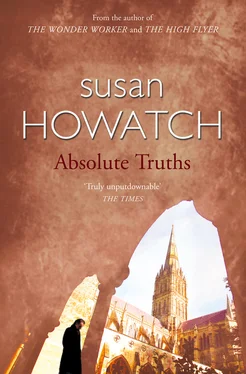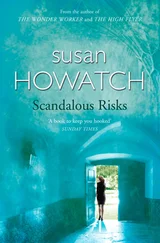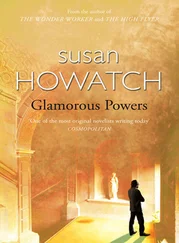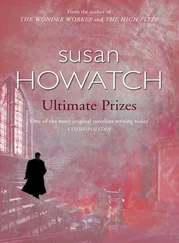Lyle read the letter and wept.
I said: ‘It’s quite unthinkable that I should read a single word of it.’ But I did. I read one word. And another. And after that I gave up trying to put the letter down. As I read I automatically moved closer to the sink in case I was overcome with the need to vomit.
‘It’s all about how wonderful you are,’ said Lyle, unable to find a handkerchief and snuffling into a tea-towel.
‘How very embarrassing.’ This traditional public-school response to any situation which flouted the British tradition of emotional understatement was utterly inadequate but no other phrase sprang to mind at such an agonising moment. The grave, simple, dignified sentences skimmed past my eyes and streamed through my defences so that in the end I was incapable of uttering a word. I could only think: this is a very great letter from a very Christian man. But I had no idea what to make of this thought. I could not cope with it. Vilely upset I reached the signature at the bottom of the last page, dropped the letter on the draining-board and waited by the sink for the vomiting to commence, but nothing happened.
‘Well, you don’t have to worry, do you?’ I heard Lyle say at last. ‘Everything’s going to be all right.’
I suddenly realised that this was true. Weak with relief I picked up the letter and read it again. Samson had made no paternal claims. My role in Charley’s life was affirmed, not undermined. The writer assumed all responsibility for the past tragedy and said he quite accepted that he had been unfit to play any part in Charley’s upbringing, but he still hoped that Charley would accept the books and later the money as a gift. They came with no obligation to respect the donor. The writer realised he had no right to demand any benign response. He wanted above all to stress how immensely grateful and happy he was that Charley should have been brought up by …
I stopped reading, folding the letter carefully and put it back in the envelope. I did not want his praise. I did not want him offering Charley the kind of selfless love which expected nothing in return. And above all else I did not want him making my wife cry and reminding us both unbearably of the past.
‘Very nice,’ I said. ‘Very sporting of him not to upset the applecart.’ The dreadful middle-class banalities sounded hideously false but at least they were safe. The next moment I said: ‘He’s got no business coming back like this. He should stay locked up in the 1930s where he belongs.’ That was not safe at all. That was a most dangerous thing to say, indicative of some convoluted state which could never be allowed to see the light of day, but Lyle was coming to my rescue, Lyle was saying: ‘We’ll lock him up again. Once all this is over we’ll put him back in the 1930s where he belongs.’
And that was that.
Or was it?
I telephoned my spiritual director. In 1956 Jon had yet to become the recluse who refused to have a telephone in his home.
‘It occurred to me,’ I said, ‘that there’s a sound moral argument for destroying the letter. For the good of the family – and to save Charley distress –’
‘This is a very bad line,’ said Jon. ‘Could you say all that again? I don’t think I can possibly have heard you correctly.’
A long silence followed before I said: ‘I’m in such a state I can’t think straight. What on earth am I going to say to Charley?’
‘Believe me, I do understand how hard it will be for you to master all your ambivalent feelings.’
‘What ambivalent feelings?’
A second silence ensued. At last I said: ‘I don’t feel ambivalent towards Charley. He’s my reward now for responding to that back-breaking call from God to bring him up. I’m devoted to Charley. I’m proud of him.’
‘Then trust him to work out what he owes and to whom.’
‘But how much of the truth should I tell him?’
Jon said nothing.
‘Must I tell the whole truth?’ I said. The absolute truth?’
‘I’m sure you know at heart what the answers to all those questions are, Charles.’
I put down the receiver.
Of course I forgot every word of my set speech. I discovered that my most important need was to keep talking – to impart the same information in a variety of different ways so that the sheer brutality of the truth was cocooned and smothered in excess verbiage. While I was speaking I was conscious that Charley, who was small and slim and looked younger than his eighteen years, was becoming smaller and slimmer, almost as if he were returning to the childhood he had so recently left. I half-thought he would interrupt me – in the end I was yearning for him to interrupt me and express all the normal emotions of incredulity, amazement and horror – but he said nothing. It was as if his volatile temperament had been frozen by the blast of an icy wind. Pale and still, he regarded me blankly with his lambent, amber eyes.
‘… and naturally you’ll want to know more about him. That’s why –’ I heard the lie coming but found myself powerless to stop it ‘– I’m glad he’s written you this letter.’ I managed to hold out the envelope with a steady hand. ‘Let him speak for himself,’ I said, ‘and then I’ll answer all your questions as truthfully as I can.’
Despite this dubious conclusion I believe in retrospect that my speech was very far from disastrous. I had reassured Charley about my feelings for him; I had said nothing adverse about Samson, and I had paved the way for the necessary question-and-answer session. However unfortunately Charley was not at that moment interested in Samson. He was much too busy trying to digest the fact that his parents had spent eighteen years deceiving him about a fundamental aspect of his identity.
Ignoring the letter which I was holding out to him he said in a voice which shook: ‘I should have been told from the beginning.’
At once I tried to adjust my approach. ‘I’m very sorry. I assure you we did consider it. But the trouble was –’
‘How could you have allowed me to believe a lie? You! The man who always preaches the importance of truth!’
‘I know how you must feel – I know how it must look – but –’
‘I think you and Mum have behaved absolutely disgustingly and I just want to go away and be sick!’
That concluded the conversation. Scarlet with emotion he rushed upstairs to his bedroom where he locked the door and refused to speak to either of us. Eventually Lyle lost her nerve and shouted: ‘I don’t care how vile you are to me but don’t you dare be vile to Charles after all he’s done for you!’ but when even this unwise reproof produced no response she turned to me and demanded, tears streaming down her face: ‘Where’s the letter? He’s got to read it.’
That was when I realised this harrowing scene must have been clearly visualised by Samson who had then done all he could to give us a helping hand. Or in other words, the clerical failure had behaved like a wise, compassionate priest, setting his own feelings aside in order to try to ensure the survival of the family, whereas I … But I could not quite work out how I had behaved. I only knew that I had always acted towards Charley with the very best of intentions.
‘The kind that pave the road to hell,’ muttered Lyle, shoving Samson’s letter under the locked bedroom door.
More agonising minutes passed. We went away. We waited. We returned. We banged futilely on the panels. We took it in turns to beg him to let us in. At last, egged on by Lyle and feeling nearly demented with anxiety, I fetched a screwdriver, opened up the lock and forced my way into the room. It was empty. Charley had made a rope of sheets and escaped through the window. The letter was lying unopened on the floor.
Читать дальше












